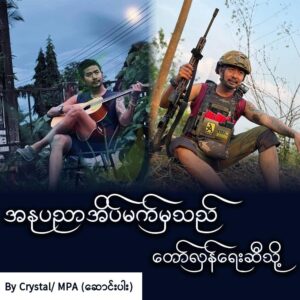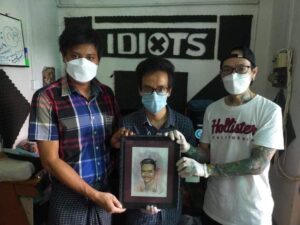(EN) Interview to the “Comerade vilin” (Ko Paihn Mhu Ko Ko), former member of the group “Idiots”
(IT) Intervista al “Compagno Vilin” (Ko Paihn Mhu Ko Ko), ex membro del gruppo “Idiots“

English Version— (Italian version below)
**By Thar Nge Lay / MPA **
When the band “Idiots” is mentioned, people of all ages—young, middle-aged, and elderly, both men and women—are already familiar with them. However, not many know all the members of the group. Among them is Ko Paihn Mhu Ko Ko, who was a photographer Ko Paihn Mhu Ko Ko, who worked as a photographer for the Idiots band, before the military coup, wanted to live a peaceful life, pursuing the work he loved.
“My dream was to become a professional freelance photographer. If I could earn well and have a stable income, I wanted to do other things I love, like singing songs,” said Comrade Vilin.
Ko Paihn Mhu Ko Ko’s revolutionary name is “Comrade Vilin.” He is 33 years old and currently serves as a communications and public relations officer at the Yangon Regional Military Command.
“He is a kind person, knows what needs to be done, and has a strong sense of responsibility. From a comrade’s perspective, there should be more people like him,” commented Comrade Rama, a fellow comrade of Vilin.
◼ **The Military Coup and the Youth’s Choice to Take Up Arms**
On February 1, 2021, the military overthrew the democratically elected government led by the National League for Democracy (NLD), seizing power illegally. The people of Myanmar are well aware of this and continue to suffer its consequences across the country. During the coup, the military unjustly arrested State Counsellor Aung San Suu Kyi and President Win Myint, along with other top political leaders. As a result, people of all ages and genders took to the streets to protest against the coup, except for a small faction associated with the military. Comrade Vilin was among those who rejected the coup. Although he did not foresee what would happen next, he was unwilling to submit to injustice.
“When I realized that the military would overthrow the democratically elected government and take control, I couldn’t accept it and joined the protests. At first, I thought the protests would end on their own, but that wasn’t the case,” he said.
Later, the military violently cracked down on the peaceful protests of the Myanmar people, even killing some protesters. Witnessing this, Vilin decided to take up arms.
“I decided to take up arms when I saw the military violently suppressing the people. If they use weapons, we must respond with weapons,” he explained.
At the end of March 2021, with the help of Idiots band singer Ko Raymon, Vilin left Yangon and joined a liberated area to undergo basic military training.
“At the end of March, Ko Raymon told me he was going to Myawaddy and had arranged military training there. So, through his connections, I reached a liberated area to take up arms. I underwent basic training for two months and completed the course before June,” Vilin recounted.
(Currently, Ko Raymon, the singer of Idiots who actively participated in the resistance movement against the military dictatorship, passed away on June 23, 2021, in a liberated area due to malaria.) After completing basic training, Vilin continued to attend advanced courses and participated in numerous battles on the ground.
“During training, I faced difficulties due to an abdominal injury. I had undergone surgery on January 15, 2021, for appendicitis, and the wound had not fully healed when I started training. I suffered more than others, but I pushed through,” he said with enthusiasm.
After completing basic training, comrades like Vilin were formally recognized as People’s Defense Forces (PDF) by the Ministry of Defense of the National Unity Government (NUG) on May 5, 2021, and collaborated with ethnic leaders to carry out military operations.
◼ **Comrade Vilin’s Battle Experiences**
After the coup, many young and elderly people left the cities to join liberated areas controlled by ethnic armed groups, where they received military training and began fighting against military-controlled areas. The military also intensified attacks on liberated areas, using heavy weapons and airstrikes, even targeting civilian villages near conflict zones. On December 15, 2021, in Lay Kay Kaw town, Karen State, a fierce battle broke out between regime soldiers and resistance forces. Vilin participated in this battle, his first ground combat experience.
“The battle of Lay Kay Kaw was my first ground combat experience. I participated in major battles as well as small skirmishes. Sometimes I fought two battles in a single day,” he said.
During the four years of revolution, Vilin sustained several injuries in battle.
“A memorable combat experience was during the Thingyan (water festival) period in April 2022, when regime soldiers attacked a PDF camp. We held our ground with two trenches, and Commander Dabo led the counterattack. It was a close-quarters battle, and I was injured by a 40-caliber bullet,” he recounted.
During the battle, the military used 40mm grenades, and one exploded near Vilin’s trench, injuring his back and temple.
“I sustained two injuries: one to my back, with blood coming from my abdomen, and one to my temple, which required four stitches. At first, I left the battlefield alone and went to the hospital. The injuries were minor, so after treatment, I tried to return to the battle, but the doctors wouldn’t allow it. The abdominal injury was small, but the doctors said it was close to the intestine and could have perforated it. They had to operate to remove the shrapnel, so the wound became larger,” Vilin explained.
◼ **Current Life in the Battalion and Happy Moments Among Comrades**
When not on the frontlines, the comrades in Vilin’s battalion live in rear camps, following the army’s management and organization. Advanced training courses, political and revolutionary discussions, and sessions to address depression and low morale are also organized. During free time, the comrades watch football matches and joke with each other.
“I support Manchester United, and so do many other comrades. Sometimes we joke that the medics treating us are all Manchester United fans, and even in battle, we tease each other about it,” Vilin said.
Vilin has always loved football since he was young. In 2009, when the Myanmar National League (MNL) began, he tried out for the Yangon United team and was selected as a reserve.
“I started supporting Manchester United as a child and always watched the matches, even late at night. I loved playing football, but I stopped due to health issues and lack of opportunities,” he explained.
◼ **The Challenges, Difficulties, and Sad Moments During the Four Years of Revolution**
During the four years of revolution, Vilin faced many challenges, including health issues and moments of depression, but he managed to overcome them.
“In the four years in the jungle, I had malaria 14 times and stomach issues six times. Sometimes I had both malaria and stomach problems. My health has never been great, and I can’t eat hard foods. The biggest challenge was mental; I often felt down about what was happening, but I always tried to pick myself up,” Vilin confessed.
After the coup, the dreams and aspirations of many Myanmar people were shattered, and there were many sad moments.
“I lost family members and relatives, and I couldn’t see them. During this time, many comrades fell one after another. It was very painful,” Vilin said.
◼ **Comrade Vilin’s Revolutionary Goal**
The Spring Revolution is not just about overthrowing the military regime but about changing the system that has oppressed the Myanmar people for over 60 years, bringing poverty, a flawed education system, and a lack of compassion. Vilin wants a system where power is in the hands of the people.
“We are an army born from the people, so we must protect and serve the people. I want a system where power is in the hands of the people, so future generations won’t have to live under the same oppressive system,” Vilin said.
Despite the military’s well-organized army, superior weapons, financial resources, and technology, Vilin and other young Myanmar people continue to resist with determination and conviction.
“When the revolution is over, I want to spend time with the people I love and live happily. But we must continue working to create an environment and system where we want to live,” Vilin concluded.
After the success of the Spring Revolution, the people of Myanmar will need to rebuild the country, which has been damaged in all aspects—health, education, and economy—to revive Myanmar.
